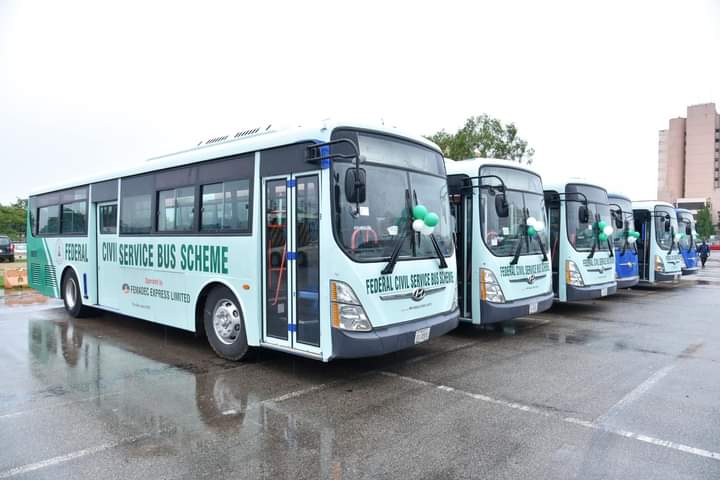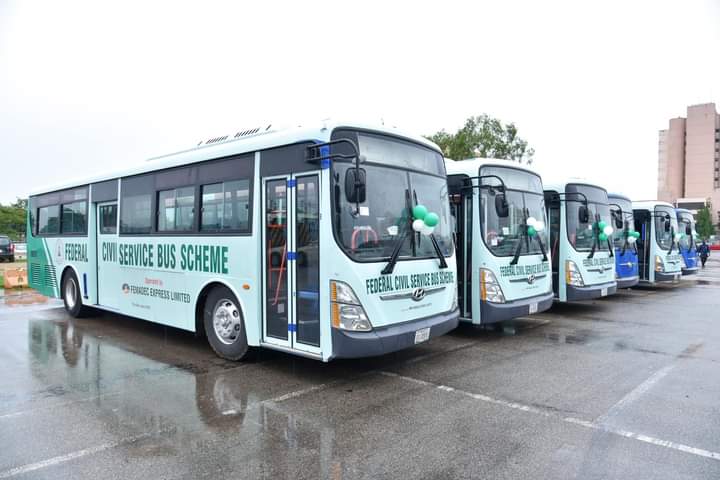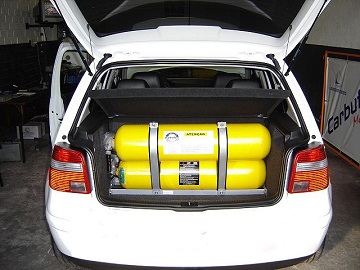Earlier in the month, President Bola Tinubu said his administration had deployed compressed natural gas (CNG) consumption buses, across the nation.
The move is part of plans to cut transport costs occasioned by the country’s exit from the petrol subsidy regime.
The president, delivering his Independence Day speech, had said “new CNG conversion kits will start coming in very soon as all hands are on deck to fast track the usually lengthy procurement process”.
Tinubu said a new chapter had been flipped in the public transportation sector through the deployment of “cheaper, safer CNG” buses across the nation.
CNG vehicles and conversion tools have been deeply entrenched in the federal government’s palliative programme since the subsidy was removed in May.
While the authorities are of the view that the innovation would ease the cost of commuting, it also comes as a strategy to avert protests by labour unions and keep Nigerians off the streets over rising energy costs.
The new drive for the deployment of CNG-powered vehicles led to the provision of N100 billion for the acquisition of 3,000 units of 20-seater buses by the federal government.
Last Friday, the federal government flagged off the presidential compressed natural gas initiative (PCNGI), waiving value-added tax (VAT) on CNG bus purchases.
Here are some key things to know about CNG buses as the implementation of the programme officially commences.
WHAT ARE CNG-POWERED BUSES?
CNG is natural gas that remains clear, odorless, and non-corrosive; serving as an alternative to petrol.
It is compressed to the point where it is lighter than air — usually approximately one percent of its original volume.
In the transport sector, CNG is utilized as a cleaner and cost-effective alternative to conventional petrol and diesel fuels.
A by-product of coal mining or crude oil production, CNG comprises mainly hydrocarbon gasses and vapor, and contains predominantly methane.
Simply put, CNG-powered vehicles run on gas, operating like petrol-powered vehicles with spark internal combustion engines.
IS IT CHEAPER?
As mentioned earlier, Tinubu had put an end to under-recovery payment when he said “subsidy is gone” in May. While the statement ended the decade-long subsidy payments, it also jacked up the pump price of petrol — a major fuel used by commercial vehicles — by over 100 percent.
Transport costs also soared across the country as a result, rekindling conversations around halting the dependence on petrol
On June 8, oil marketers pledged to donate 100 mass transit CNG buses to mitigate the effects of the removal of the subsidy, canvassing for the adoption of gas as an alternative source of energy.
Speaking during the Independence Day ceremony, Tinubu said the CNG buses will operate at a fraction of current petrol prices, positively affecting transport fares.
Also, oil marketers said CNG, when fully deployed, will be over 400 percent cheaper than petrol.
But Jide Pratt, an energy expert, told TheCable that the use of CNG to fuel vehicles would result in about 40 percent potential cost savings.
“To compare (CNG) with PMS, we will have a savings on fuel by about 30 to 40% circa and when you compare the mileage it’s probably just marginally better,” he said.
The main downside, he said, is that it takes a while longer to build the infrastructure for CNG “i.e the plants for holding CNG and load or refill locations compared to PMS outlets”.
CNG PER KG TO COST N230
Toyin Subaru, special assistant to the president on special duties and domestic affairs, had said CNG will cost N230 per kg as against petrol which is sold at a higher price.
“We are going to develop an app that will enable you locate where a CNG station is located. We should be able to buy gas for our cars at N230 per KG as against the cost of petrol which is N680 per litre,” he said.
The presidential aide said this would help every Nigerian save about two-thirds of their transport cost.
Subaru added that the federal government plans to have one million CNG vehicles on Nigerian roads by 2027.
According to the Nigerian Gas Association (NGA), CNG is suitable for petrol cars, tricycles, vans, and lorries — but not petrol generators.
WHY CNG?
In December 2020, the federal government rolled out its National Gas Expansion Program (NGEP), which involves the conversion of cars and generators from petrol to gas.
The government had said the programme, which was expected to deliver at least one million vehicle conversions by the end of 2021, was in tandem with its plan to create cheaper alternative fuel for equipment and vehicles.
With Nigeria’s abundant gas reserves of over 200 trillion cubic feet, CNG is seen as a more viable option.
According to a research publication authored by Chikwendu Ubani and Ikpaisong S. Ubong, running vehicles on CNG would greatly reduce the “troubles” encountered in importing fuel into the country.
“This will also cut down largely the hardly available foreign exchange expended in bringing in PMS for fuelling vehicles,” the researchers said.
In addition, CNG cars are said to run quieter than petrol and diesel vehicles, which results in less noise pollution; and also produces fewer emissions and can improve energy security.
“What will happen is that cost savings should have a direct impact on transportation costs,” Pratt said.
“I do think as we go the CNG road we should adopt the LPG strategy as well, as it’s a lower hanging fruit; as skid tanks are easily installed in current retail outlets and trucks are readily available or can be purchased.”
Although the autogas programme was initially stalled, the present administration has shown interest in fast-tracking its implementation.





